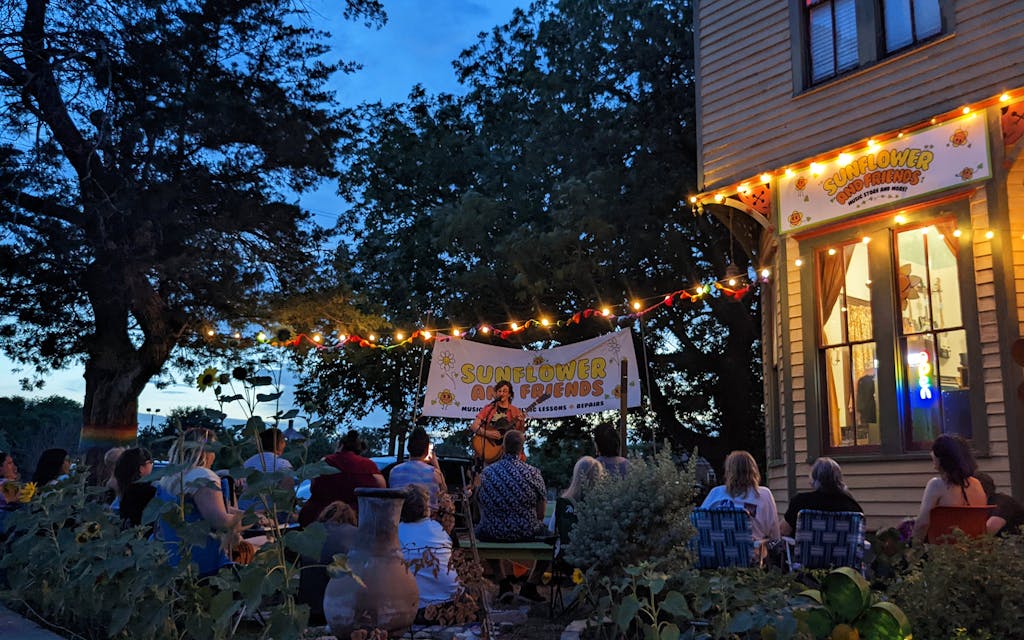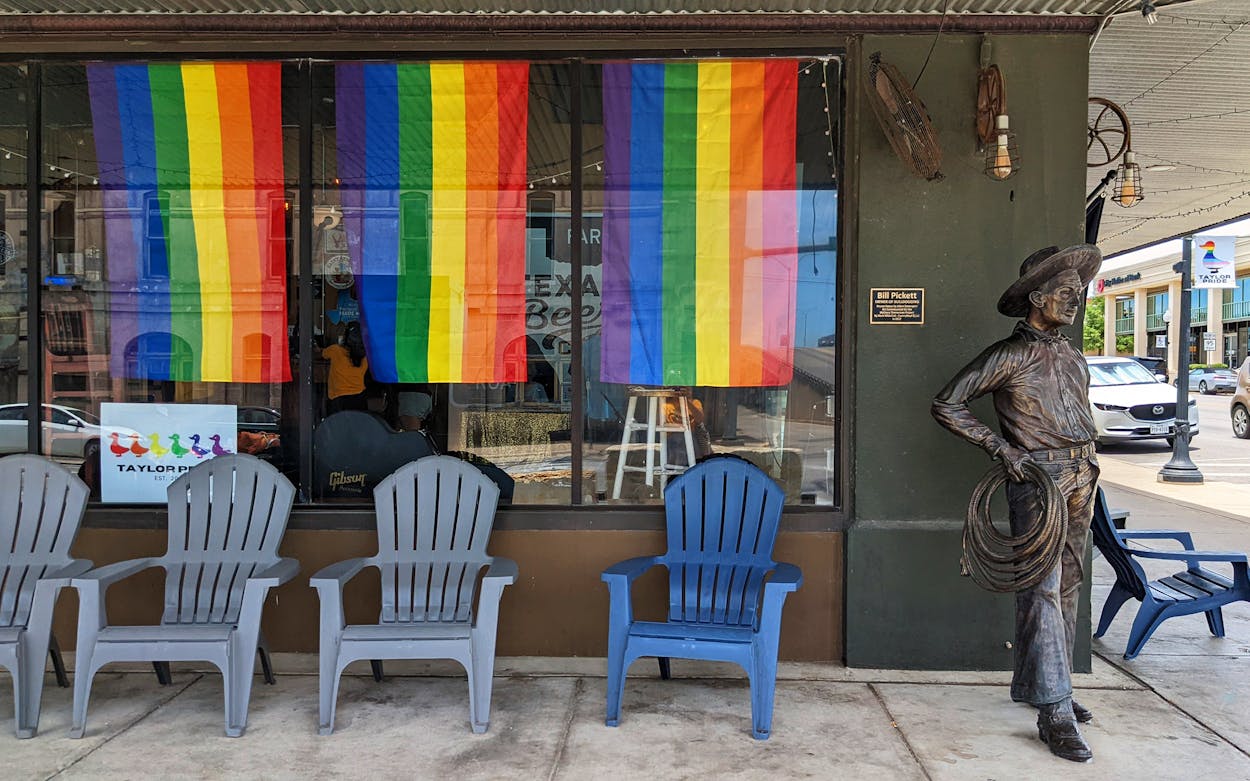On the Lockhart town square, business owners plastered rainbow stickers on their storefronts declaring “Everyone Is Welcome Here.” At Lone Star Workshop, a window sign framed in sheer, rainbow-hued curtains declared “Love Wins.” A block away, on a stage outside a music store in a Victorian-style former residence, transgender bluegrass musician “Creekbed” Carter Hogan regaled the crowd with a rendition of Willie Nelson’s “The Woman With the Rose Tattoo.” Later, a group gathered in a truck bed backed up to the venue and began clapping in time with the refrain.
“Man, I’m gonna bring a truck full of queers to all my gigs! You guys are great!” said Hogan, who uses he/they pronouns. The event, a queer artist showcase, was one of many during Lockhart’s (population: 14,379) inaugural Pride Week this June. Small towns and suburban communities throughout Central Texas are holding Pride celebrations for the first time this year, including Bastrop (9,688), Leander (59,202), Pflugerville (65,191), and Round Rock (119,468). “We don’t have to drive to Austin for Pride anymore. We have our own now,” said Ben Hilliard, vice president of Round Rock Pride. Several residents and organizers I interviewed observed that LGBTQ residents in their towns are becoming more visible now that their communities are “out” as welcoming, inclusive places that recognize the contributions of all.
This year, even as a Republican member of the Texas House of Representatives raised a ruckus over children attending drag shows, drag events sold out in Bastrop and Lockhart, a drag roundtable was planned in Taylor, RuPaul’s Drag Race star Tammie Brown performed in Pflugerville, a drag story time was included in the Pride of Dripping Springs event, and, on June 4, Round Rock hosted a drag performance and fireworks display set to Katy Perry’s “Firework” that the “kids just ate up,” according to Jose Orta, a retired U.S. Air Force veteran who drove from Taylor to attend the festivities. (Every Pride schedule we viewed delineated between family-friendly and adult-only drag shows.)
The groups sponsoring these events have seen growth in city support, lists of sponsors, and their social media followings, but they have also reported an increase in harassment. Some residents in community Facebook groups have expressed disapproval of Pride events and displays of solidarity with LGBTQ residents. Despite online and occasional in-person pushback from a vocal minority, the crowds showing up for small-town Central Texas Pride events—during one of the hottest Junes on record—tell a different story.


Central Texas LGBTQ activists credit Taylor, 33 miles northeast of downtown Austin, for inspiring this year’s wave of small-town pride. Brooke Ashley Eden, a local barista and singer-songwriter who has lived in Taylor since 2018, recalls an early conversation about the possibility of a Pride event in town: “When I first moved to Taylor, I made a joke to someone like, ‘Yeah, if we had a gay pride parade, it would just be like three of us walking down a sidewalk.’ ” But the town’s inaugural Pride festival last year spilled out into the streets, and afterward, attendees from Bastrop, Leander, and Pflugerville reached out to Taylor Pride president Denise Rodgers for advice on how to organize celebrations in their communities. From there, mentoring relationships—and a group chat, the lifeblood of any planning committee these days—began.
In March 2020, when college campuses closed down and shifted to virtual instruction, college students and displaced workers, including young adults living all across the country, moved back home. That’s when Rodgers, who identifies as pansexual, cofounded Taylor Pride. The organization’s volunteers came together to support, as she put it, “college students or young workers who had come out and were living as their authentic selves [elsewhere], but essentially had to go back in the closet for an indefinite amount of time.”
In October 2021, Governor Abbott signed House Bill 25, which prohibited student athletes from participating in sports in line with their gender identities, instead requiring them to participate based on the genders on their birth certificates. This February, Attorney General Ken Paxton released a formal opinion declaring that gender-affirming medical care for children, whether it involves surgery or medication, amounts to “child abuse.” As much of the Texas GOP has led with homophobic rhetoric and legislation, citizens in Taylor and around the state have ramped up their preparations for Pride Month. According to Taylor mayor Brandt Rydell, a woman approached him in his own front yard in early June to say, “When I see these signs, all I can think about is men having sex with men and women having sex with women.” Some residents say that while they don’t bear any animus against their LGBTQ neighbors, they fear that public expressions of support such as Pride events might cause their children or grandchildren to be “recruited” towards a non-cisgender or heterosexual existence. (Claims which are rooted in homophobia.) Still, the pride signs Rodgers and other volunteers distributed to homes at the beginning of the COVID-19 pandemic are now commonplace throughout Taylor. In response to the pushback, LGBTQ homeowners and their allies have added even more pieces of rainbow flair to their yards.
The coordinators of Pride events in Bastrop, Lockhart, Round Rock, and Taylor all told me that their organizations had faced either online harassment or in-person counterprotesters. They were prepared. In Taylor, Rodgers and her volunteers recruited allied members of the community to serve on a “parasol patrol” and hold up rainbow-colored umbrellas to block attendees’ views of protesters. On the night of a transgender Q&A event in Lockhart, local volunteers stood outside “to just kind of watch things,” as organizer Jessica Parker put it. In addition to volunteer muscle, each group coordinated with local police and sheriffs’ departments. The extra protection came in handy when, in one case, a Temple man who claimed to be a law student filmed himself walking around Taylor with a gun strapped to his belt, spewing homophobic (and ungrammatical) rhetoric.
Many LGBTQ community organizers and residents I spoke with said they generally feel safe and welcome in their towns. “I can go to H-E-B and see about forty-five people I know. People know who I am as a person,” said Eden, who will perform a Pride-themed acoustic guitar set on June 25. “They no longer just see me as some weird queer kid with a purple mullet and a goofy tattoo. They see Brooke the human who also works at the coffee shop and does music. That has eased a lot of my fears in Taylor.”
Round Rock retiree Richard Parson, who has lived in Round Rock for 12 years, attended the first-ever Taylor Pride event in June 2021 after he read about it on Facebook. He still remembers Mayor Brandt Rydell’s speech, which appealed to attendees to be more inclusive year-round, not just during Pride Month. “Taylor will be unable to reach its fullest potential without the inclusion, the involvement, and the active engagement . . . of the LGBTQ community,” the mayor told the crowd. Parson shook Rydell’s hand after the speech and told Rydell he wanted to go back to Round Rock to start a Pride organization of his own. Two volunteers joined him on the spot.
This year, Round Rock Pride hosted its own inaugural event. Parson and Hilliard, the Round Rock Pride vice president, were moved by the thousands who attended Round Rock’s Pride festival on June 4. The event opened with a speech from Mayor Craig Morgan and a performance by the Austin Gay Men’s Chorus. The Austin Babtist [sic] Women, a group of men dressed as Texas church grandmothers, serenaded the crowd gathered in the Centennial Plaza amphitheater with an uplifting gospel performance, an act followed by a children’s story time led by drag performers. One more drag show closed out the day. “The scene that stands out to me is all the families showing up with kids of all ages,” Hilliard said. “Watching the kids come up to the stage and tip the [drag] queens—that’s something I wish I could’ve done as a kid.” Hilliard is one of many Central Texas small-town pride organizers, attendees, and performing artists I spoke to who expressed a similar wistful tension—both wishing visible LGBTQ communities had been available to them sooner in life and grateful that they are vehicles for joy, community, and political activation now.
These Pride events have even healed old family wounds borne of rejection. Taylor’s Jose Orta identifies as gay and served in the military during the height of the “don’t ask, don’t tell” policy. In his speech at Taylor Pride last year, Orta addressed attacks on the LGBTQ community through both physical harm and legislation. The speech mended fences within Orta’s own family, especially with his sister. “That was the first time she had heard me speak in public,” Orta said, “and I could see how proud she was of me. And I think that’s what Pride festivals in small towns are aiming to do. They’re trying to break down barriers, because we have always been here. We have always existed. But now we are at least being seen as a vibrant part of the community.” After the event, Orta decided to run for the local county commissioner office. If he wins, he’ll be the first openly gay Latino to serve.

Despite the Texas GOP’s targeting of the LGBTQ community by calling homosexuality “an abnormal lifestyle choice” and weaponizing the state’s Child Protective Services to investigate families providing gender-affirming care for their transgender and nonbinary children, Orta and others I interviewed were hopeful. Event turnout and sponsorships have exceeded expectations, and so has voter registration. Acting chair of Bastrop Pride Brett Douglas estimates that of 300 attendees at Bastrop Pride in the Park, 25 registered to vote. Parson said 37 new voters registered at Round Rock Pride. “Pride celebrations have always been political,” says Eden. “There are a lot of fired-up people who want to find as many ways to try and make change, and voting is a solid way to do so, especially in small-town local and county elections.”
Given the current political climate facing LGBTQ Texans, some outsiders might wonder why they want to continue living here. Those I interviewed said they wanted to be close to family and H-E-B and the rolling hills of Central Texas. They prefer small towns over flashy cities, spaces for gardening and livestock over cramped apartments. They’re drawn to the burgeoning arts and music communities in their towns as well as to the LGBTQ communities they have formed. Hogan turned the question around, asking why I stay in Texas—making a clear point about the “just leave” argument in and of itself. And then Hogan added, “This is the first place I ever performed anything I’ve written. The scene here is so special and beautiful.”






